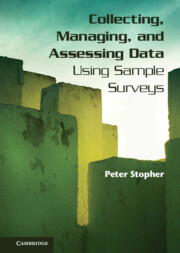Book contents
- Frontmatter
- Contents
- Figures
- Tables
- Acknowledgements
- 1 Introduction
- 2 Basic statistics and probability
- 3 Basic issues in surveys
- 4 Ethics of surveys of human populations
- 5 Designing a survey
- 6 Methods for conducting surveys of human populations
- 7 Focus groups
- 8 Design of survey instruments
- 9 Design of questions and question wording
- 10 Special issues for qualitative and preference surveys
- 11 Design of data collection procedures
- 12 Pilot surveys and pretests
- 13 Sample design and sampling
- 14 Repetitive surveys
- 15 Survey economics
- 16 Survey implementation
- 17 Web-based surveys
- 18 Coding and data entry
- 19 Data expansion and weighting
- 20 Nonresponse
- 21 Measuring data quality
- 22 Future directions in survey procedures
- 23 Documenting and archiving
- References
- Index
15 - Survey economics
Published online by Cambridge University Press: 05 June 2012
- Frontmatter
- Contents
- Figures
- Tables
- Acknowledgements
- 1 Introduction
- 2 Basic statistics and probability
- 3 Basic issues in surveys
- 4 Ethics of surveys of human populations
- 5 Designing a survey
- 6 Methods for conducting surveys of human populations
- 7 Focus groups
- 8 Design of survey instruments
- 9 Design of questions and question wording
- 10 Special issues for qualitative and preference surveys
- 11 Design of data collection procedures
- 12 Pilot surveys and pretests
- 13 Sample design and sampling
- 14 Repetitive surveys
- 15 Survey economics
- 16 Survey implementation
- 17 Web-based surveys
- 18 Coding and data entry
- 19 Data expansion and weighting
- 20 Nonresponse
- 21 Measuring data quality
- 22 Future directions in survey procedures
- 23 Documenting and archiving
- References
- Index
Summary
Introduction
The biggest problem with surveys is their cost. Most clients for surveys operate from limited budgets, such that the budget available for a survey is rarely ever sufficient for the desired accuracy and coverage of the survey (Stopher and Metcalf, 1996). As has been discussed in previous chapters of this book, the art of survey design is one of trade-offs or compromise, and this is certainly the case in the area of survey economics. The specific trade-offs involved are those pertaining to producing the greatest accuracy and coverage for the least cost.
Economics in survey design is a serious issue. There are too many instances of surveys having been commissioned and undertaken with too little attention to the economics of the survey design, resulting in one of two outcomes. Either the data from the survey end up never being used and the money spent is effectively wasted, because the data turn out not to be suited to the task at hand, or the firm undertaking the survey produces data fit for the purpose, but only at the cost of a major loss of money in executing the survey – a situation that has, unfortunately, resulted in the bankruptcy of several survey firms around the world over the years.
- Type
- Chapter
- Information
- Collecting, Managing, and Assessing Data Using Sample Surveys , pp. 356 - 364Publisher: Cambridge University PressPrint publication year: 2012



